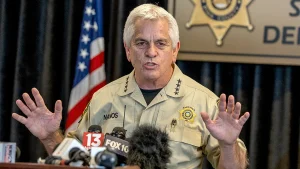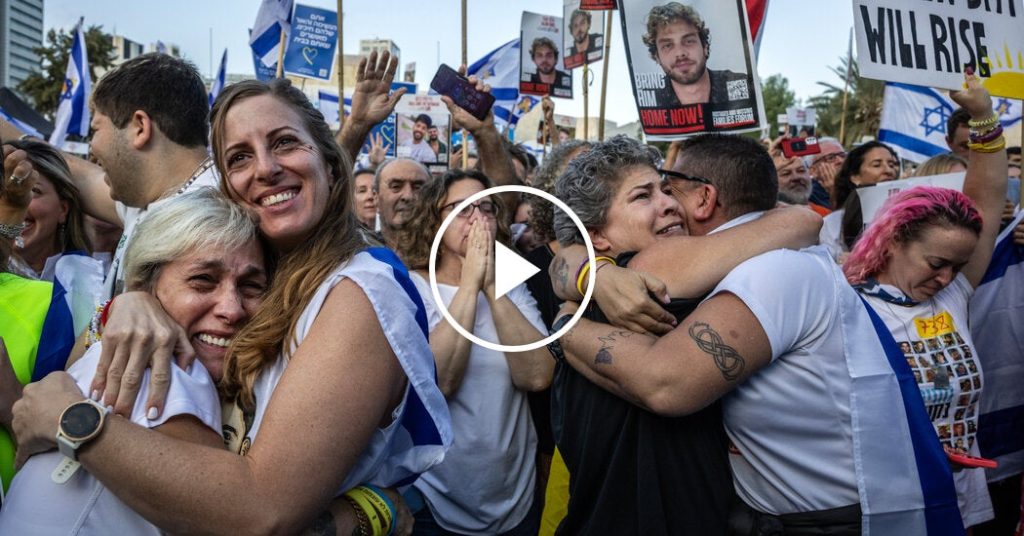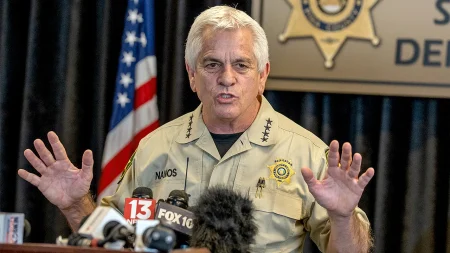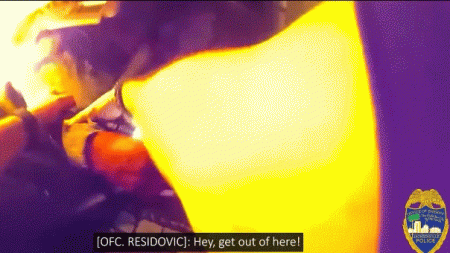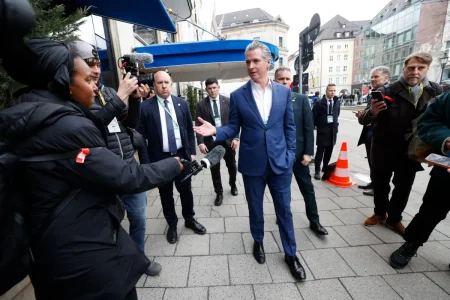Joy and Relief: Israeli Hostage Alon Ohel Returns Home in Emotional Reunion
Family Embraces Freed Hostage After Two Years of Captivity
In what family members described as “the best day of our lives,” Israeli hostage Alon Ohel has returned home after more than two years in Hamas captivity, released as part of a newly negotiated cease-fire agreement between Israel and Hamas. The emotional homecoming, which took place amid a backdrop of ongoing conflict and diplomatic negotiations, marks a significant moment in the prolonged hostage crisis that began during the October 2023 Nova music festival attack.
“There are no words to describe how we feel. The best day of my life, really,” said a family member during a tearful reunion at what appeared to be Israel’s “Hostages Square,” a memorial site that has become a gathering place for families of those still held in Gaza. The joyful scene of Ohel’s return stands in stark contrast to the violence that led to his capture, when Hamas militants attacked the Nova music festival near the Gaza border on October 7, 2023. Ohel was among those who attempted to flee the chaos before being taken across the border into Gaza, joining hundreds of others who were kidnapped during the coordinated assault that initiated the ongoing conflict.
His release comes as part of a cease-fire agreement that has been the focus of intense international diplomacy in recent months. While the details of the broader deal remain complex, Ohel’s return represents one of the tangible successes in the ongoing efforts to secure the release of all remaining hostages. International mediators, including representatives from Qatar, Egypt, and the United States, have been working tirelessly to broker agreements that would include both cease-fire terms and hostage releases, though progress has often been halting and fragile amid continued military operations.
A Changed Man Returns: The Journey to Recovery Begins
The emotional toll of captivity was evident in the words of family members who spoke about welcoming home not just their beloved Alon, but someone who has inevitably been transformed by his ordeal. “I hope to know my new brother. This is my new brother, my old brother and my new brother I hope to meet him as he is today,” said one relative, acknowledging the psychological impact of Ohel’s prolonged detention. This sentiment reflects the complex reality facing many families of returned hostages, who must navigate the delicate process of reunion while recognizing that their loved ones have endured traumatic experiences that may have profoundly changed them.
Medical experts who specialize in trauma recovery note that former hostages often face significant challenges in readjusting to normal life after extended periods of captivity. Dr. Sarah Levinson, a trauma specialist who has worked with previously released hostages but is not directly involved in Ohel’s case, explained in a previous interview that “the psychological journey of recovery is often as challenging as the physical one. Reintegration involves processing trauma while simultaneously adapting to a world that has continued moving forward during their absence.” For Ohel and others like him, the return home marks not an end but rather the beginning of a lengthy healing process that will require specialized support, patience, and understanding.
The family’s mention of music—specifically Ohel’s piano—highlights one potential avenue for healing. “He will play the piano that is in his room and for the music to heal him,” a family member said, suggesting that returning to familiar passions might provide therapeutic benefit. Music therapy has been recognized as an effective complementary treatment for trauma survivors, offering non-verbal means of expression and emotional processing. For Ohel, whose connection to music likely runs deep given his attendance at the Nova music festival, the piano may serve as both a link to his pre-captivity identity and a tool for navigating his recovery.
Broader Context: The Ongoing Hostage Crisis and Peace Negotiations
While Ohel’s return brings immense relief to his immediate circle, it also underscores the ongoing plight of those who remain in captivity. According to recent figures released by the Israeli government, dozens of hostages are still believed to be held by Hamas and other militant groups in Gaza, though exact numbers remain difficult to verify as some may no longer be alive. The families of those still missing continue their agonizing wait, clinging to hope with each announcement of potential deals while navigating a landscape of uncertain information and political complexities.
The cease-fire agreement that facilitated Ohel’s release represents the latest in a series of fragile arrangements that have temporarily halted fighting at various points throughout the two-year conflict. These agreements have typically included provisions for humanitarian aid, limited hostage releases, and temporary cessations of military operations. However, establishing a more permanent resolution has proven elusive as both sides maintain seemingly irreconcilable positions on key issues, including security arrangements, territorial control, and the status of remaining hostages.
International reaction to the latest agreement has been cautiously optimistic, with diplomatic representatives emphasizing that while individual hostage releases are cause for celebration, they must be part of a broader framework leading toward sustainable peace. United Nations Secretary-General António Guterres called Ohel’s release “a positive step that should be built upon with continued diplomatic engagement aimed at securing the freedom of all remaining hostages and establishing conditions for lasting peace.” Meanwhile, humanitarian organizations continue to emphasize the dire conditions faced by civilians in Gaza, where infrastructure damage, limited access to essential services, and ongoing displacement have created what many aid workers describe as an unprecedented humanitarian crisis.
The Long Journey Home: From Music Festival to Captivity and Back
Ohel’s journey began at the Nova music festival, an event that was supposed to celebrate peace and unity but instead became the site of one of the most traumatic days in recent Israeli history. The festival, held in the desert near the Gaza border, drew thousands of young people before Hamas militants launched their surprise attack, killing approximately 260 attendees and taking others hostage. Survivors described scenes of chaos and terror as festival-goers attempted to flee, with many like Ohel being captured during their escape attempts.
The specifics of Ohel’s time in captivity remain largely private, as is often the case with returned hostages who are given space to share their experiences only if and when they choose to do so. What is known is that conditions for hostages have been described as extremely challenging by those previously released. Limited food, inadequate medical care, psychological pressure, and constant uncertainty about their fate have been reported by former captives. International humanitarian organizations, including the Red Cross, have repeatedly called for access to hostages but have been granted only limited contact throughout the conflict.
The moment of reunion captured in the footage of Ohel’s return—the family members jumping on each other in excitement—represents the culmination of years of advocacy, hope, and determination. For families of hostages, the waiting period is marked not just by grief but by active engagement in efforts to secure their loved ones’ release. Many have formed advocacy groups, met with political leaders, and maintained a constant presence in public discourse to ensure their family members are not forgotten as political attention shifts and other crises emerge. These efforts have been crucial in maintaining pressure on both governmental authorities and international mediators to prioritize hostage negotiations within the broader conflict resolution process.
Looking Forward: Rebuilding Lives Amid Ongoing Regional Instability
As Ohel begins the process of rebuilding his life, his family expressed determination to move forward despite the challenges ahead. “From now we need to do everything to get our life back, and it will happen,” one family member stated with conviction. This sentiment reflects the resilience that has characterized many hostage families throughout the prolonged crisis—a determination to reclaim some sense of normalcy despite the profound disruption to their lives.
For Ohel personally, reintegration will likely involve a carefully managed process combining medical care, psychological support, and gradual reintroduction to everyday activities. Experts in hostage recovery emphasize the importance of creating safe spaces where former captives can regain a sense of control and agency after prolonged periods where basic choices were denied to them. While privacy concerns typically limit public information about specific treatment protocols, specialized teams including physicians, psychologists, and social workers are generally involved in supporting returned hostages through their initial adjustment period and longer-term recovery.
The broader regional context into which Ohel returns remains deeply complex and uncertain. The conflict that began with the October 7 attacks has evolved through multiple phases, claiming thousands of lives on both sides and reshaping political realities across the Middle East. While diplomatic efforts continue toward establishing more comprehensive peace arrangements, significant obstacles remain. For Ohel and his family, as for many Israelis and Palestinians, the path forward involves navigating not only personal recovery but also the collective trauma of communities deeply affected by prolonged conflict. As one observer at the reunion site noted, “Each homecoming is both an individual miracle and a reminder of how much healing remains to be done—for families, for communities, and for the region as a whole.”
In the immediate aftermath of his return, however, the focus remains on the tangible joy of reunion, on the piano waiting in Ohel’s room, and on the process of getting to know the person who has returned—both the brother they remember and the one shaped by experiences they can scarcely imagine. In that space between celebration and recognition of change lies the complex reality of homecoming after captivity—a journey that is only beginning.
